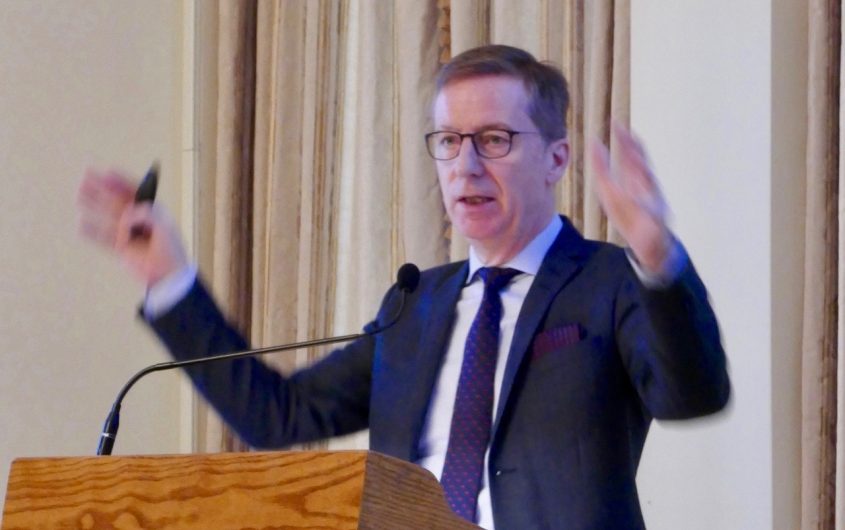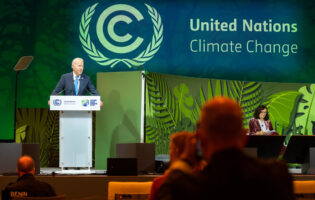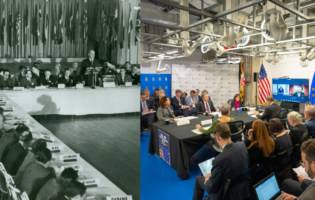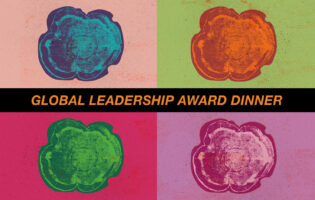
Strategies for the European Union in the Third Age of Globalization with Michael Hüther
Event Summary
Michael Hüther, the director of the German Economic Institute and one of Germany’s most influential economic thinkers, spoke at a March 5 breakfast event with AGI about his theory of the Third Age of Globalization. According to Hüther, the Third Age of Globalization is emerging as a result of exhaustion from the Second Globalization, which has left a trend of stagnation in economic growth globally. He argues that the Second Globalization was marked by distinctly Western characteristics of development and that attempts to get developing countries on board did not meet expectations. Trade and capital allocation have mostly been concentrated in the Northern Hemisphere, and within regions rather than between them, leaving many developing countries dependent upon the “winners” of the Second Globalization.
Hüther spoke to the specific critiques of globalization. Initially, it was assumed that globalization would bring security to Western countries because it unfolded according to their values, but this has not been seen to be the case by many. On one hand, on the political left there has been opposition to the traditional neo-liberal principles that govern predominant economic institutions, and to the WTO and trade agreements like the Transatlantic Trade and Investment Partnership and the EU-Canada free trade agreement. There has also been pushback from the political right which stresses the importance of sovereignty and the nation-state in economic development.
All of these factors point to the need for a greater sense of inclusiveness in globalization in order to build a more cohesive economic system.
Key to an emerging Third Age of Globalization are the strategies that the West should use to shape this new era. Hüther notes that the European Union should take on a leading role in developing the nature of the Third Age. To do this, the EU needs to define what the core values guiding the Third Age will be with—at minimum—a normative clarification, a plan to solve the crisis of confidence in developing countries, and an emphasis on civil society in the process of globalization. Arguably, all of these factors point to the need for a greater sense of inclusiveness in globalization in order to build a more cohesive economic system. As 2019 is a “year of change” with European Parliament elections and a new European Commission, the EU will need to do all of this while navigating an identity crisis provoked by differing narratives about its role.
One of the main points raised during the discussion was the systemic clash between the West and the East, specifically with regard to norms. Hüther mentioned that while the European Union looks to the east, its fundamental values align with the United States. The EU and the U.S. need to form a strong transatlantic relationship to counter the norms that China is seeking to spread. The lack of civil society in China puts the transatlantic relationship in a unique position to build this normative clarification that can be a base for the Third Age of Globalization. Although power may be shifting toward China, in the long run it is an open question whether that country will fully accept market-driven innovation, which requires some economic anarchy to be successful.
Although power may be shifting toward China, in the long run it is an open question whether that country will fully accept market-driven innovation, which requires some economic anarchy to be successful.
It will also be important to look inward at the Western system and the internal conflicts arising in Europe. If the European Union is going to provide a normative base for this Third Age of Globalization, it will need to face the challenge of the Central and Eastern European states and the alternative values that are a source of contention within its own system. Hüther argued that this conflict cannot be managed by the European Court of Justice; answers have to be provided closer to the people.
Hüther also suggested that inclusiveness means some practices from the Second Globalization will need to be updated. Economic development in contexts of weak statehood in developing countries demonstrated that pushing Western notions of stable statehood and the specific economic priorities of Western standards might not necessarily be the most successful method. The role of emerging markets in shaping the Third Age of Globalization needs to be encouraged, and the European Union should learn to accept different preferences.









